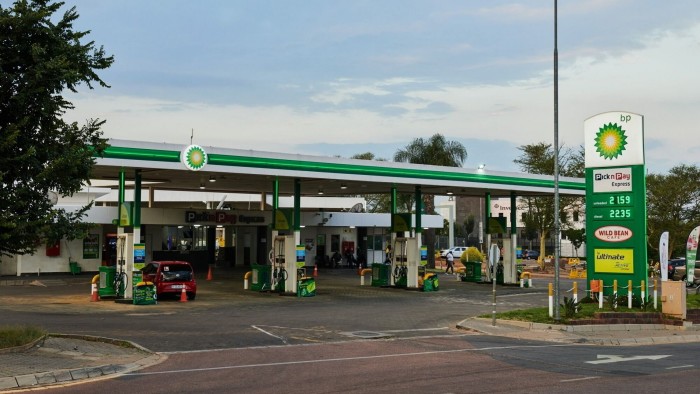Unlock the Editor’s Digest for free
Roula Khalaf, Editor of the FT, selects her favourite stories in this weekly newsletter.
Is it better to treat the symptoms or the underlying causes? Ideally, the latter. Yet sometimes rubbing balm into surface wounds is the only immediate option.
That might be BP chief executive Murray Auchincloss’s fallback option, too. He will doubtless try to drum up enthusiasm for the nearly 120-year-old British oil and gas major at its capital markets day later this month. But his self-help options are limited.
Enthusiasm for BP is in short supply. Its shares have lost a quarter of their value over the past two years, against a 4 per cent gain at Shell and 3 per cent decline at TotalEnergies. BP’s enterprise value, as a multiple of forward ebitda, carries an 11 per cent discount to its European rivals.
To get an immediate sense of relief, Auchincloss will have to address investors’ most pressing worries: BP’s net debt and share buybacks. The former, at about $50bn when factors such as leases and hybrid bonds are included on RBC Capital’s numbers, puts it among the most heavily geared of the European energy majors.
But a meaningful reduction in debt puts BP in conflict with its aim to give shareholders generous returns. A year ago, it promised to repurchase $7bn of shares in each of 2024 and 2025. Brent crude prices have since dropped more than 4 per cent. Analysts expect this year’s buyback target to fall too, to $4bn.
There are other short-term salves Auchincloss could reach for — including trimming capital expenditure, probably in clean energy and hydrogen. Currently BP expects to spend between $14bn and $18bn annually to 2030. Equinor this week halved its expected investment in renewables and low-carbon technology. Overall capex savings at BP would, however, be limited by a need to divert more cash to stabilise upstream oil production, says Bank of America’s Christopher Kuplent. There may be more assets BP can sell.
None of these options would tackle BP’s deeper problem: investors’ lack of conviction about how it can grow in future decades. A grand energy transition strategy unveiled by former chief executive Bernard Looney in 2020 has already been pared back. Some analysts question the quality of its upstream assets.
For that reason, BP will no doubt continue to be touted as a potential takeover candidate. Hypothetical spreadsheet exercises suggest UK rival Shell could cover a 30 per cent premium over BP’s £68bn of equity value by lopping even just 25 per cent off its $16bn of annual general and administrative expenses. There would be cultural, competition and a myriad other challenges, of course.
Auchincloss might do a decent enough patch-up job to give BP’s shares a temporary boost — and if he is really lucky, lure a buyer.
nathalie.thomas@ft.com
https://www.ft.com/content/dc868f19-5f72-4c8d-a06e-8a9a02c5f1ba


